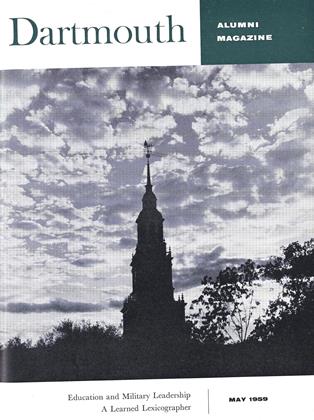A GREEK vase, first presented to an outstanding youth in Athens more than 2400 years ago, will be the basis of a similar award to be inaugurated at Dartmouth this month.
The vase, a Panathenaic amphora, was donated to the College by Ray W. Smith '18 of Dublin, N. H., a collector of classical antiquities whose private collection of ancient glass is considered one of the finest in the world. The amphora was first presented to the winner of a Panathenaic Games event about 490 B.C.
The College has decided to make symbolic award of the vase this year to an undergraduate from New Hampshire who best exemplifies the four Greek criteria of excellence: intellectual attainments, leadership, character, and athletic prowess.
Mr. Smith's gift becomes one of the College's greatest art treasures. The vase was purchased in Europe and recently brought to this country. It is of such archaeological interest that the Metropolitan Museum of Art in New York City placed it on exhibit last month and will keep it there for about a month, until the middle of May. It is believed to be the first inscribed Panathenaic amphora painted by the so-called "Berlin master" to be brought to America. The "Berlin master," an unknown artist who painted certain of the amphora, is identified by his style and is thus named because one of his famous works was on display at the Berlin Museum.
An amphora was filled with olive oil from sacred groves near Athens and awarded to a winner in the Panathenaic Games. The one given to Dartmouth by Mr. Smith is 26 inches high and 16 inches in diameter. On one side it has a painting of Athena, the Greek goddess associated with artistic and intellectual attainments, and on the other side a painting of a wrestling scene.
At the ancient Olympic Games, which drew participants from all over Greece, only the famed laurel wreaths were awarded to the winners. The Panathenaic Games, at which the amphorae were awarded, were for citizens of territory governed by the city-state of Athens.
Mr. Smith became interested in classical antiquities while in Europe for many years as a soldier, oil executive, and State Department official. His noted collection of glass covers the period 1500 B.C. to 1200 A.D. and has been given a special exhibition at the Corning Museum of Glass. He is an international figure in his field and belongs to a number of archaeological societies in this country and abroad. Dartmouth last June honored him with the Doctorate of Humane Letters.
Gone from the Hanover scene is an old but unlamented landmark: South Hall at the corner of College and Lebanon streets. The space will be used as a Hopkins Center parking area.
 View Full Issue
View Full Issue
More From This Issue
-
 Feature
FeatureGove (gōv), Philip (fĩl'ìp) B.
May 1959 By JAMES B. FISHER '54 -
 Feature
FeatureDartmouth Study Urges ROTC Program Changes to Meet Nation's Needs
May 1959 By JOHN HURD '21 -
 Feature
FeatureFourteen Gained — Three to Go
May 1959 -
 Feature
FeatureWar Memorial Planned in Center
May 1959 -
 Article
ArticleTHE FACULTY
May 1959 By HAROLD L. BOND '42 -
 Class Notes
Class Notes1915
May 1959 By PHILIP K. MURDOCK, JAMES LeR. LAFFERTY







